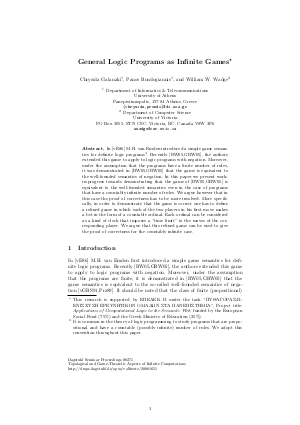General Logic Programs as Infinite Games
Authors Chrysida Galanaki, Panos Rondogiannis, William W. Wadge
-
Part of:
Volume:
Dagstuhl Seminar Proceedings, Volume 8271
Part of: Series: Dagstuhl Seminar Proceedings (DagSemProc) - License:
 Creative Commons Attribution 4.0 International license
Creative Commons Attribution 4.0 International license
- Publication Date: 2008-11-05
File

PDF
DagSemProc.08271.5.pdf
- Filesize: 209 kB
- 11 pages
Document Identifiers
Subject Classification
Keywords
- Infinite Games
- Negation in Logic Programming
- Well-Founded Semantics
Metrics
- Access Statistics
-
Total Accesses (updated on a weekly basis)
0Document
0Metadata
Abstract
In [vE86] M.H. van Emden introduced a simple game semantics for definite logic programs. Recently [RW05,GRW05], the authors extended this game to apply to logic programs with negation. Moreover, under the assumption that the programs have a finite number of rules, it was demonstrated in [RW05,GRW05] that the game is equivalent to the well-founded semantics of negation. In this paper we present work-in-progress towards demonstrating that the game of [RW05,GRW05] is equivalent to the well-founded semantics even in the case of programs that have a countably infinite number of rules. We argue however that in this case the proof of correctness has to be more involved. More specifically, in order to demonstrate that the game is correct one has to define a refined game in which each of the two players in his first move makes a bet in the form of a countable ordinal. Each ordinal can be considered as a kind of clock that imposes a "time limit" to the moves of the corresponding player. We argue that this refined game can be used to give the proof of correctness for the countably infinite case.
Cite As Get BibTex
Chrysida Galanaki, Panos Rondogiannis, and William W. Wadge. General Logic Programs as Infinite Games. In Topological and Game-Theoretic Aspects of Infinite Computations. Dagstuhl Seminar Proceedings, Volume 8271, pp. 1-11, Schloss Dagstuhl – Leibniz-Zentrum für Informatik (2008)
https://doi.org/10.4230/DagSemProc.08271.5
BibTex
@InProceedings{galanaki_et_al:DagSemProc.08271.5,
author = {Galanaki, Chrysida and Rondogiannis, Panos and Wadge, William W.},
title = {{General Logic Programs as Infinite Games}},
booktitle = {Topological and Game-Theoretic Aspects of Infinite Computations},
pages = {1--11},
series = {Dagstuhl Seminar Proceedings (DagSemProc)},
ISSN = {1862-4405},
year = {2008},
volume = {8271},
editor = {Peter Hertling and Victor Selivanov and Wolfgang Thomas and William W. Wadge and Klaus Wagner},
publisher = {Schloss Dagstuhl -- Leibniz-Zentrum f{\"u}r Informatik},
address = {Dagstuhl, Germany},
URL = {https://drops.dagstuhl.de/entities/document/10.4230/DagSemProc.08271.5},
URN = {urn:nbn:de:0030-drops-16519},
doi = {10.4230/DagSemProc.08271.5},
annote = {Keywords: Infinite Games, Negation in Logic Programming, Well-Founded Semantics}
}
